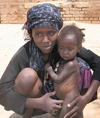
This post by Joe Read of Physicians for Human Rights originally appeared on the PHR blog.
Last Thursday marked the end of General Gration’s first 12 months as U.S. special envoy to Sudan – an event that closely followed the one year anniversary of the Government of Sudan’s expulsion of humanitarian organizations in March 2009.
In the course of the past 12 months, the humanitarian community and U.N. country team in Sudan have made significant efforts to rebuild programming disrupted by the expulsion of 13 international and 3 Sudanese NGOs – efforts that have been encouraged by the U.S. envoy’s office. Now one year on, however, the loss of specialized programming continues to challenge NGOs and U.N. agencies working on the ground.
As Physicians for Human Rights and numerous other organizations pointed out in a public letter to Secretary of State Hillary Clinton last November, multi-sectoral programming addressing the vulnerability and needs of women and girls has been affected seriously by this disruption in programs and services. But broader efforts to re-establish programming lost in the expulsions have been unable to rebuild the base of gender expertise in the humanitarian community prior to 2009.
The range of women-specific concerns spans all areas of humanitarian programming in Darfur: specialized health needs; different levels of education; cultural issues concerning sanitation and hygiene services; and, not least, the widespread incidence of sexual violence across Darfur. There is an urgent need to improve the coverage of relief distribution to target women effectively, expand programming into rural areas, and encourage the mainstreaming of gender concerns by NGOs and U.N. agencies.
Even prior to the expulsions, the breadth and consistency of women-focused programming had suffered a number of setbacks in 2008, including the closure of many women’s centers, the suspension of psycho-social programming in some instances, and increasing obstacles for NGOs to communicate with other agencies. In order to remedy this, we need strong sector coordination and the commitment of sufficient resources to the U.N. lead agency for gender-based violence, UNFPA, to implement the strategic plan designed to address these issues.
In response to this urgent crisis of treatment and services, Physicians for Human Rights has issued a briefing paper to the special envoy’s office: Action Agenda for Realizing Treatment and Support for Women and Girls in Darfur, outlining the conditions of this crisis and immediate actions needed to realize both responsive and proactive programming to reduce the vulnerability of women and girls in Darfur and provide support to survivors. The paper outlines the need for a commitment from the U.S. Government to expend the necessary resources for women and girls in Darfur and to establish a consistent message in the special envoy’s diplomatic relations.
Over the past 12 months, a number of humanitarian sectors – water, sanitation, shelter – have been restored and rebuilt, yet vital services such as psychosocial support, medical and legal outreach, and livelihoods support for women and girls remain devastated by the impact of the expulsions. It is the duty of the special envoy’s office to ensure that U.S. engagement in critical events, such as the upcoming Sudan elections and the continuing Darfur peace accords, does not divert attention from the unmet needs of women and girls any longer. By March 31, 2010, General Gration should announce his office’s strategy to address the following:
• U.S. Government support for humanitarian programming to reduce the vulnerability of women and research to establish a recommended service provision model that can be replicated in under-served communities.
• U.S. Government funding for sector coordination to the U.N. lead agency for Gender-based Violence in Darfur, UNFPA. This funding commitment will allow for UNFPA strategic planning to increase treatment and support and facilitate broader initiatives to reduce vulnerability to violence.
• U.S. Government use of diplomatic leverage to ensure that the Government of Sudan take responsibility for managing and acting on information received through the Tripartite Reporting Mechanism and institute a Rapid-Reporting mechanism between State and Federal bodies of the Humanitarian Aid Commission, or HAC.
• U.S. Government encouragement of troop-contributing and police-contributing countries to boost deployment of the UNAMID peacekeeping force; the provision of outstanding equipment, in particular military helicopter assets, remains critical to increasing the mobility and operational impact of the mission in a volatile security environment. A commitment is also needed to boost the number of female troops and police sent by police- and troop- contributing countries.
• U.S. Government promotion or development of a multi-year funding mechanism for relief, early recovery and emergency projects through the 2010-2012, pre-election to post-referendum period, for projects to mitigate the risks of sexual and gender-based violence should complex emergencies arise in Sudan and to provide the necessary treatment and support for survivors.
As the largest donor to the humanitarian operations in Darfur, and as a key diplomatic player engaged with the Government of Sudan, the U.S. Government has the opportunity to assure that the urgent needs of women and girls in Darfur are met. The U.S. special envoy’s office represents the political and diplomatic interests of the American people and has the ability to commit both the diplomatic and financial resources of the U.S. Government to address the needs of survivors, and prevent further violence.
Physicians for Human Rights invites all individuals and organizations who wish to see these recommendations become a reality to contact the envoy’s office and ask for a plan by March 31st 2010. Contact jread at phrusa dot org for more information.
Photo: A mother and child in Darfur (IRIN)

